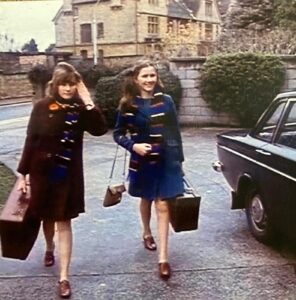Stories
"Why do you bother Miss? There is no hope for me.
I will always live in Torry. I will never escape."
It broke my heart.

In 2019, I was employed as a teacher at an International school in Tashkent. During this time, I saw how difficult life was for women. To take two examples amongst many.
A young wife, who lived directly above me in the soviet style tenement block in which I lived, had a terrible existence. On one occasion I watched in disbelief as her husband walked himself down the concrete staircase that connect the floors within the block, proud in his smartly pressed military uniform, and ignore his wife as she fumbled with the pushchair on the stairs trying to manage the baby on her own. His face so stern that I was too scared to approach and offer my assistance. Every evening, I heard him shout loudly at his wife whilst she sobbed, and the baby cried. She was alone and a prisoner in that flat, with no means of escape. I reported the matter of course, but was told nothing would be done. That this was only a ‘domestic matter’!
The only women safe from unwelcome advances whilst out of doors, were mothers with pushchairs or those accompanied by a male. This is why I was glad that a male colleague walked with me to my home at the end of each school day. There were taxis of course, but they came with their own problem!
Going out of doors to get food was like running the gauntlet. On one occasion a man similar in age to myself, swiped his payment card for my food at the supermarket and then grabbed my bags at the check-out. He insisted on walking with me home, forcing conversation upon me. On approaching the front door, he told me he would bring my bags inside. Fortunately, the main door to the tenement block was opened by a male resident. I pretended I knew him and went to great lengths to thank the man for his help, stressing the word ‘help’, took hold of my bags and then quickly got inside and shut the door behind me. It was a difficult situation and on reflection I should have told him to keep the shopping he had paid for and find some way to give him the slip. My concern thereafter was that he knew where I lived! I was angry with myself that I was unable to think straight at the time, it was so unexpected. Their wedding ceremonies in particular, give a rather fitting description of the oppressive relations of power.
I am just going to put it out there. Do you think the ‘nuclear family’ is an ideal environment in which to raise children?

Immediately after the 1983 to 1985 famine in Ethiopia, it was not unusual to see lepers begging under food stalls and pregnant women laying bricks on the top of tall buildings. Women were paid half of what men were paid, and so they were hired first. Bricks were stacked high upon their heads, whilst their babies were attached to their back by a large blanket. At the same time, their husbands were seated at the bottom of the buildings smoking and at the end of the day lining up to receive their wife’s’ wages. I have no photographic evidence of this, only what has been burned into my memory.’ No photography’ signs were everywhere in the capital.

The 1970s was not an easy decade and I remember the ‘Winter of discontent’ very clearly. However, my main concern was that my younger sister and I did not attend school. We remained at home for the first two and a half years of secondary school. The schools were notoriously bad in the area in which we lived. To cut a long story short, my parents were put in jail for not sending us to school and my sister and I were placed in a children’s home, where because of all the publicity, a Spanish millionaire stepped in and paid for my sister and me to attend a girls’ boarding school in Devon. I want to stress that our parents were loving, kind and very principled, and had very good reasons for not sending us to such schools in the early 1970s. We are very grateful to the gentleman who paid the school fees so we could receive the gift of a good education.
What are your views on the education you received? Was it fit for purpose or is there anything that could have been put in place to make it more appropriate for the world in which we live?
Once we were driving in South West Africa and got lost. We had to turn back at the barrel of a gun, with our firstborn strapped in the back of the Land Rover. It was rather scary and looking back was a stupid thing to have done with a young infant in the back. I guess we have all done stupid things. We were lucky it didn’t end badly.
In Addis Ababa the high school principal and the director of the International School were flown out of the country at gun point after it became known that they had imported computers using the diplomatic pouch to avoid paying taxes. As a result, we were given no wages for four months as we paid off the school’s debt. Meanwhile, we lived on a diet of oranges and very little else. During this time, my husband was bitten by the dog of a diplomat. We asked if the dog could be checked for rabies, but … and this is hard to believe I know … the dog belonged to a diplomat, and hence had diplomatic immunity! As a result, there was no requirement on the owner to have the dog tested. Consequently, my husband had to go through agonizing anti-rabies shots in his abdomen and a week later, independent of the rabies event, he came down with typhoid. The diplomat, who had a child in the school where we were both teachers, presented my husband with a bottle of whisky as a token of his appreciation. On the back of the whisky bottle, it said ‘Courtesy of Band Aid’. Naturally, we declined it.
In the mid 1990s, we moved to El Salvador, Central America to take up teaching positions there. Our three children were upset to see children dressed in rags and without shoes walking between the traffic selling oranges. In the same way, children would wait for us to finish eating and then scramble for the leftovers before the plates were cleared. The huge disparity of wealth in the country, which is typical of many in Central and South America, is the warning. If we are not careful, we could end up like this: where one percent of the population controls ninety nine percent of the wealth. Mr Fink of Black Rock is targeting the privatisation of the western infrastructure to rival the Belt and Road Initiative of China. He was very powerful at the recent G7 talks; others saw the dollar signs. I am not sure where this may lead but can easily see the rest of the world joining the likes of El Salvador. In the UK, the top twenty percent of the population own 63 percent of the country’s wealth, and the bottom twenty percent have only 0.5 percent. The UK ranks 9th out of 38 OEDC countries and one of the most unequal countries in the world. I find this knowledge extremely troublesome.
Whilst teaching in Qatar from 2010 to 2017, one of the wealthiest countries in the world, I got to know several wonderful Filipino women who were domestic workers for the oil companies. Their pay was very low, and yet they worked hard to send their hard-earned money home to support their families. Their children were raised by the grandparents and the mothers got to see their children every two years.
Young mothers across the globe balance the need for childcare and their jobs while earning wages that can hardly sustain their existence. What are the reasons that women are opting not to have children? There is no need for much thinking to comprehend the reason why. With all the threats being made in today’s world, I would not recommend any parent to take a chance, and yet we need our children. Society should treasure our children, and yet everywhere I look I see children negatively impacted by the severe economic pressures placed on young families.

In 2019, I was employed as a teacher at an International school in Tashkent. During this time, I saw how difficult life was for women. To take two examples amongst many.
A young wife, who lived directly above me in the soviet style tenement block in which I lived, had a terrible existence. On one occasion I watched in disbelief as her husband walked himself down the concrete staircase that connect the floors within the block, proud in his smartly pressed military uniform, and ignore his wife as she fumbled with the pushchair on the stairs trying to manage the baby on her own. His face so stern that I was too scared to approach and offer my assistance. Every evening, I heard him shout loudly at his wife whilst she sobbed, and the baby cried. She was alone and a prisoner in that flat, with no means of escape. I reported the matter of course, but was told nothing would be done. That this was only a ‘domestic matter’!
The only women safe from unwelcome advances whilst out of doors, were mothers with pushchairs or those accompanied by a male. This is why I was glad that a male colleague walked with me to my home at the end of each school day. There were taxis of course, but they came with their own problem!
Going out of doors to get food was like running the gauntlet. On one occasion a man similar in age to myself, swiped his payment card for my food at the supermarket and then grabbed my bags at the check-out. He insisted on walking with me home, forcing conversation upon me. On approaching the front door, he told me he would bring my bags inside. Fortunately, the main door to the tenement block was opened by a male resident. I pretended I knew him and went to great lengths to thank the man for his help, stressing the word ‘help’, took hold of my bags and then quickly got inside and shut the door behind me. It was a difficult situation and on reflection I should have told him to keep the shopping he had paid for and find some way to give him the slip. My concern thereafter was that he knew where I lived! I was angry with myself that I was unable to think straight at the time, it was so unexpected. Their wedding ceremonies in particular, give a rather fitting description of the oppressive relations of power.
I am just going to put it out there. Do you think the ‘nuclear family’ is an ideal environment in which to raise children?

Immediately after the 1983 to 1985 famine in Ethiopia, it was not unusual to see lepers begging under food stalls and pregnant women laying bricks on the top of tall buildings. Women were paid half of what men were paid, and so they were hired first. Bricks were stacked high upon their heads, whilst their babies were attached to their back by a large blanket. At the same time, their husbands were seated at the bottom of the buildings smoking and at the end of the day lining up to receive their wife’s’ wages. I have no photographic evidence of this, only what has been burned into my memory.’ No photography’ signs were everywhere in the capital.

The 1970s was not an easy decade and I remember the ‘Winter of discontent’ very clearly. However, my main concern was that my younger sister and I did not attend school. We remained at home for the first two and a half years of secondary school. The schools were notoriously bad in the area in which we lived. To cut a long story short, my parents were put in jail for not sending us to school and my sister and I were placed in a children’s home, where because of all the publicity, a Spanish millionaire stepped in and paid for my sister and me to attend a girls’ boarding school in Devon. I want to stress that our parents were loving, kind and very principled, and had very good reasons for not sending us to such schools in the early 1970s. We are very grateful to the gentleman who paid the school fees so we could receive the gift of a good education.
What are your views on the education you received? Was it fit for purpose or is there anything that could have been put in place to make it more appropriate for the world in which we live?
Once we were driving in South West Africa and got lost. We had to turn back at the barrel of a gun, with our firstborn strapped in the back of the Land Rover. It was rather scary and looking back was a stupid thing to have done with a young infant in the back. I guess we have all done stupid things. We were lucky it didn’t end badly.
In Addis Ababa the high school principal and the director of the International School were flown out of the country at gun point after it became known that they had imported computers using the diplomatic pouch to avoid paying taxes. As a result, we were given no wages for four months as we paid off the school’s debt. Meanwhile, we lived on a diet of oranges and very little else. During this time, my husband was bitten by the dog of a diplomat. We asked if the dog could be checked for rabies, but … and this is hard to believe I know … the dog belonged to a diplomat, and hence had diplomatic immunity! As a result, there was no requirement on the owner to have the dog tested. Consequently, my husband had to go through agonizing anti-rabies shots in his abdomen and a week later, independent of the rabies event, he came down with typhoid. The diplomat, who had a child in the school where we were both teachers, presented my husband with a bottle of whisky as a token of his appreciation. On the back of the whisky bottle, it said ‘Courtesy of Band Aid’. Naturally, we declined it.
In the mid 1990s, we moved to El Salvador, Central America to take up teaching positions there. Our three children were upset to see children dressed in rags and without shoes walking between the traffic selling oranges. In the same way, children would wait for us to finish eating and then scramble for the leftovers before the plates were cleared. The huge disparity of wealth in the country, which is typical of many in Central and South America, is the warning. If we are not careful, we could end up like this: where one percent of the population controls ninety nine percent of the wealth. Mr Fink of Black Rock is targeting the privatisation of the western infrastructure to rival the Belt and Road Initiative of China. He was very powerful at the recent G7 talks; others saw the dollar signs. I am not sure where this may lead but can easily see the rest of the world joining the likes of El Salvador. In the UK, the top twenty percent of the population own 63 percent of the country’s wealth, and the bottom twenty percent have only 0.5 percent. The UK ranks 9th out of 38 OEDC countries and one of the most unequal countries in the world. I find this knowledge extremely troublesome.
Whilst teaching in Qatar from 2010 to 2017, one of the wealthiest countries in the world, I got to know several wonderful Filipino women who were domestic workers for the oil companies. Their pay was very low, and yet they worked hard to send their hard-earned money home to support their families. Their children were raised by the grandparents and the mothers got to see their children every two years.
Young mothers across the globe balance the need for childcare and their jobs while earning wages that can hardly sustain their existence. What are the reasons that women are opting not to have children? There is no need for much thinking to comprehend the reason why. With all the threats being made in today’s world, I would not recommend any parent to take a chance, and yet we need our children. Society should treasure our children, and yet everywhere I look I see children negatively impacted by the severe economic pressures placed on young families.

